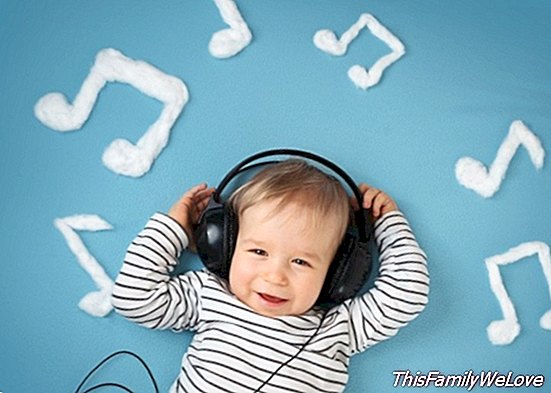Music improves speech learning in babies

That music is good is something that almost no one doubts: it enhances creativity, it can help relaxation or dispersion and, of course, it entertains. However, researchers from the Institute of Learning and Neurology of the University of Washington, in the United States, have focused on studying a very important part of Music: its effect on babies.
The conclusion has been clear: the music improves the brain development of babies and therefore, help in learning the hablto. This is what the experts say, who have published their study at the National Academy of Sciences. In this publication they explain that they are "certain melodies" that "improve the brain processing of babies nine months, both in terms of music and new sounds of speech ".
The benefits of music in babies
The study's lead author, Christina Zhao, comments in her writing that the study "suggests that experiencing rhythmic musical patterns improves the ability to detect and predict rhythmic patterns of speech." In short, this means that listening to music at a very early age can have "a global effect on the cognitive abilities of babies."
The objective of the work was Find out if by teaching children musical rhythms they could be helping them to recognize the rhythms of language, that is, the beginnings of their first words. To do this, the authors studied how babies recognize patterns of activity to later predict what came next. The importance in the perception of these patterns is clear: it is an "important cognitive ability", so improving it at an early age "may have long-term effects".
In total, the researchers used 39 babies who played with their parents and who were guided to do activities. Of these 39 individuals, 20 listened to the music while the other 19 were the control group. In this way, it was possible to observe how all the babies played and developed social skills, with the difference that one of the groups learned the musical rhythms.
Brain response of babies to the rhythm
This is important. As the authors explain in their study, the rhythm of the syllables helps the listener to define and discriminate between the sounds that people make when speaking and other noises. It also teaches to understand what is said. "And this is the ability that allows babies to distinguish sounds so they can talk," the researchers emphasize.
After the first test already described, the next step: the families returned a week later so that the researchers could measure the brain responses of the babies. Through scans, the babies listened to music and words under a rhythm that was interrupted. In this way it was possible to verify how the brains of the children could detect this interruption.
"The babies that were in the group with music had stronger brain responses in relation to the interruption", the authors explain, emphasizing that these responses were produced both in music and in speech. "This suggests a link between listening to music and the ability of children to detect patterns of sounds," they say.
All this points to the importance of increasing the experience with music for children, both at home and in schools. "The effects of music go beyond the music itself," the researchers continue, who are blunt when they say that experiencing music "has the potential to increase these skills and improve children's ability to detect and react quickly to music." the patterns in the world. "
Music is good for children
This study is another one that joins a long list of research that has shown how music helps newborns in multiple aspects: it helps them eat better, sleep more and cry less, for example.
"When listening to classical music, children stimulate themselves, exercise cortical neurons and strengthen the circuits used for mathematics," explains Professor Gordon Shaw, of Irvine University in California (United States). In sum: "music stimulates the inherent brain patterns and reinforces the tasks of complex reasoning".
Among the benefits of music for the little ones in the house are many, although they can probably be summarized with this list:
- Promotes your emotional intelligence.
- It favors the tranquility.
- Seat the foundations of his personality.
- Develop your creativity, your concentration and coordination.
- Accelerates language learning.
- Develop reasoning and taste for music.
- Enrich emotions.
- Strengthens the circuits used for mathematics.
Music also in pregnancy
The benefits of music can be felt in the baby before it even gets home, although in this sense the researchers do not end up agreeing. There are many scientific works that have found that babies react to sounds when they are in the womb, but few know exactly what the movements of the fetus mean.
In this regard, many people believe that music to babies in pregnancy, something that is not at all corroborated by science. Even so, the experts are not opposed to putting music to children before they are born: here, what prevails is moderation. That is, play music to the baby if you want, but do not do it at high volumes. Of course, better to opt for classical music rather than strident sounds.
Damián Montero




